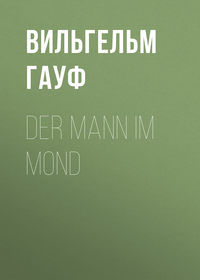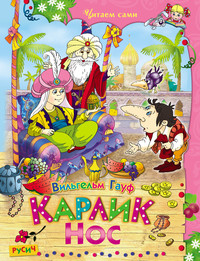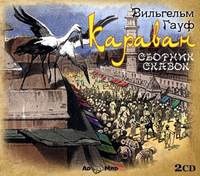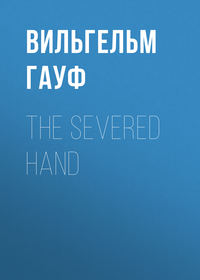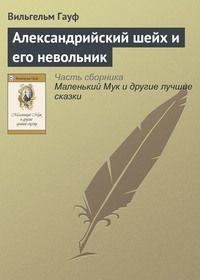 полная версия
полная версияThe Oriental Story Book: A Collection of Tales
The proposition of the old man pleased me well. In anxious expectation we saw the night set in. Near the cabin was a little room, to which we determined to retire. We bored several holes in the door, large enough to give us a view of the whole cabin; then we shut it as firmly as we could from within, and Ibrahim wrote the name of the Prophet in all four corners of the room. Thus we awaited the terrors of the night.
It might again have been about the eleventh hour, when a strong inclination for sleep began to overpower me. My companion, thereupon, advised me to repeat some sentences from the Koran, which assisted me to retain my consciousness. All at once it seemed to become lively overhead; the ropes creaked, there were steps upon the deck, and several voices were plainly distinguishable. We remained, a few moments, in intense anxiety; then we heard something descending the cabin stairs. When the old man became aware of this, he began to repeat the words which his grandfather had taught him to use against spirits and witchcraft:
“Come you, from the air descending,Rise you from the deep sea-cave,Spring you forth where flames are blending,Glide you in the dismal grave:Allah reigns, let all adore him!Own him, spirits—bow before him!”I must confess I did not put much faith in this verse, and my hair stood on end when the door flew open. The same large, stately man entered, whom I had seen nailed to the mast. The spike still passed through the middle of his brain, but he had sheathed his sword. Behind him entered another, attired with less magnificence, whom also I had seen lying on the deck. The Captain, for he was unquestionably of this rank, had a pale countenance, a large black beard, and wildly-rolling eyes, with which he surveyed the whole apartment. I could see him distinctly, for he moved over opposite to us; but he appeared not to observe the door which concealed us. The two seated themselves at the table, which stood in the centre of the cabin, and spoke loud and fast, shouting together in an unknown tongue. They continually became more noisy and earnest, until at length, with doubled fist, the Captain brought the table a blow which shook the whole apartment. With wild laughter the other sprang up, and beckoned to the Captain to follow him. The latter rose, drew his sabre, and then both left the apartment. We breathed more freely when they were away; but our anxiety had still for a long time no end. Louder and louder became the noise upon deck; we heard hasty running to and fro, shouting, laughing, and howling. At length there came an actually hellish sound, so that we thought the deck and all the sails would fall down upon us, the clash of arms, and shrieks—of a sudden all was deep silence. When, after many hours, we ventured to go forth, we found every thing as before; not one lay differently—all were as stiff as wooden figures.
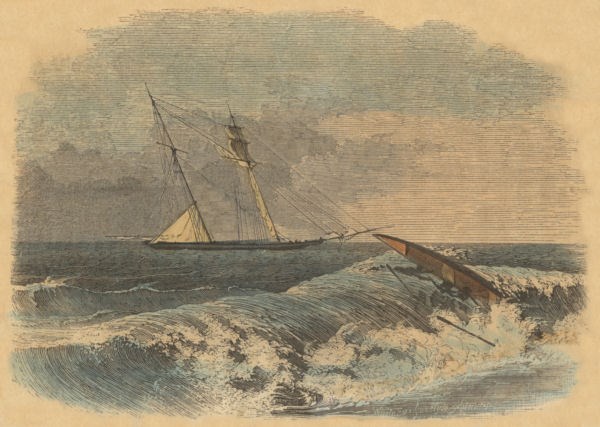
Thus passed we several days on the vessel; it moved continually towards the East, in which direction, according to my calculation, lay the land; but if by day it made many miles, by night it appeared to go back again, for we always found ourselves in the same spot when the sun went down. We could explain this in no other way, than that the dead men every night sailed back again with a full breeze. In order to prevent this, we took in all the sail before it became night, and employed the same means as at the door in the cabin; we wrote on parchment the name of the Prophet, and also, in addition, the little stanza of the grandfather, and bound them upon the furled sail. Anxiously we awaited the result in our chamber. The ghosts appeared this time not to rage so wickedly; and, mark, the next morning the sails were still rolled up as we had left them. During the day we extended only as much as was necessary to bear the ship gently along, and so in five days we made considerable headway.
At last, on the morning of the sixth day, we espied land at a short distance, and thanked Allah and his Prophet for our wonderful deliverance. This day and the following night we sailed along the coast, and on the seventh morning thought we discovered a city at no great distance: with a good deal of trouble we cast an anchor into the sea, which soon reached the bottom; then launching a boat which stood upon the deck, we rowed with all our might towards the city. After half an hour we ran into a river that emptied into the sea, and stepped ashore. At the gate we inquired what the place was called, and learned that it was an Indian city, not far from the region to which at first I had intended to sail. We repaired to a Caravansery, and refreshed ourselves after our adventurous sail. I there inquired for a wise and intelligent man, at the same time giving the landlord to understand that I would like to have one tolerably conversant with magic. He conducted me to an unsightly house in a remote street, knocked thereat, and one let me in with the injunction that I should ask only for Muley.
In the house, came to me a little old man with grizzled beard and a long nose, to demand my business. I told him I was in search of the wise Muley; he answered me that he was the man. I then asked his advice as to what I should do to the dead bodies, and how I must handle them in order to remove them from the ship.
He answered me that the people of the ship were probably enchanted on account of a crime somewhere upon the sea: he thought the spell would be dissolved by bringing them to land, but this could be done only by taking up the planks on which they lay. In the sight of God and justice, he said that the ship, together with all the goods, belonged to me, since I had, as it were, found it; and, if I would keep it very secret, and make him a small present out of my abundance, he would assist me with his slaves to remove the bodies. I promised to reward him richly, and we set out on our expedition with five slaves, who were supplied with saws and hatchets. On the way, the magician Muley could not sufficiently praise our happy expedient of binding the sails around with the sentences from the Koran. He said this was the only means, by which we could have saved ourselves.
It was still pretty early in the day when we reached the ship. We immediately set to work, and in an hour placed four in the boat. Some of the slaves were then obliged to row to land to bury them there. They told us, when they returned, that the bodies had spared them the trouble of burying, since, the moment they laid them on the earth, they had fallen to dust. We diligently set to work to saw off the bodies, and before evening all were brought to land. There were, at last, no more on board than the one that was nailed to the mast. Vainly sought we to draw the nail out of the wood, no strength was able to start it even a hair’s-breadth. I knew not what next to do, for we could not hew down the mast in order to bring him to land; but in this dilemma Muley came to my assistance. He quickly ordered a slave to row to land and bring a pot of earth. When he had arrived with it, the magician pronounced over it some mysterious words, and cast it on the dead man’s head. Immediately the latter opened his eyes, drew a deep breath, and the wound of the nail in his forehead began to bleed. We now drew it lightly forth, and the wounded man fell into the arms of one of the slaves.
“Who bore me hither?” he exclaimed, after he seemed to have recovered himself a little. Muley made signs to me, and I stepped up to him.
“Thank thee, unknown stranger; thou hast freed me from long torment. For fifty years has my body been sailing through these waves, and my spirit was condemned to return to it every night. But now my head has come in contact with the earth, and, my crime expiated, I can go to my fathers!”
I entreated him, thereupon, to tell how he had been brought to this horrible state, and he began—
“Fifty years ago, I was an influential, distinguished man, and resided in Algiers: a passion for gain urged me on to fit out a ship, and turn pirate. I had already followed this business some time, when once, at Zante, I took on board a Dervise, who wished to travel for nothing. I and my companions were impious men, and paid no respect to the holiness of the man; I, in particular, made sport of him. When, however, on one occasion he upbraided me with holy zeal for my wicked course of life, that same evening, after I had been drinking to excess with my pilot in the cabin, anger overpowered me. Reflecting on what the Dervise had said to me, which I would not have borne from a Sultan, I rushed upon deck, and plunged my dagger into his breast. Dying, he cursed me and my crew, and doomed us not to die and not to live, until we should lay our heads upon the earth.
“The Dervise expired, and we cast him overboard, laughing at his menaces; that same night, however, were his words fulfilled. One portion of my crew rose against me; with terrible courage the struggle continued, until my supporters fell, and I myself was nailed to the mast. The mutineers, however, also sank under their wounds, and soon my ship was but one vast grave. My eyes also closed, my breath stopped—I thought I was dying. But it was only a torpor which held me chained: the following night, at the same hour in which we had cast the Dervise into the sea, I awoke, together with all my comrades; life returned, but we could do and say nothing but what had been done and said on that fatal night. Thus we sailed for fifty years, neither living nor dying, for how could we reach the land? With mad joy we ever dashed along, with full sails, before the storm, for we hoped at last to be wrecked upon some cliff, and to compose our weary heads to rest upon the bottom of the sea; but in this we never succeeded. Now I shall die! Once again, unknown preserver, accept my thanks, and if treasures can reward thee, then take my ship in token of my gratitude.”
With these words the Captain let his head drop, and expired. Like his companions, he immediately fell to dust. We collected this in a little vessel, and buried it on the shore: and I took workmen from the city to put the ship in good condition. After I had exchanged, with great advantage, the wares I had on board for others, I hired a crew, richly rewarded my friend Muley, and set sail for my fatherland. I took a circuitous route, in the course of which I landed at several islands and countries, to bring my goods to market. The Prophet blessed my undertaking. After several years I ran into Balsora, twice as rich as the dying Captain had made me. My fellow-citizens were amazed at my wealth and good fortune, and would believe nothing else but that I had found the diamond-valley of the far-famed traveller Sinbad. I left them to their belief; henceforth must the young folks of Balsora, when they have scarcely arrived at their eighteenth year, go forth into the world, like me, to seek their fortunes. I, however, live in peace and tranquillity, and every five years make a journey to Mecca, to thank the Lord for his protection, in that holy place, and to entreat for the Captain and his crew, that He will admit them into Paradise.
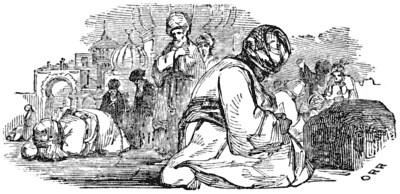
The march of the Caravan proceeded the next day without hinderance, and when they halted, Selim the Stranger began thus to speak to Muley, the youngest of the merchants:
“You are, indeed, the youngest of us, nevertheless you are always in fine spirits, and, to a certainty, know for us, some right merry story. Out with it then, that it may refresh us after the heat of the day.”
“I might easily tell you something,” answered Muley, “which would amuse you, nevertheless modesty becomes youth in all things; therefore must my older companions have the precedence. Zaleukos is ever so grave and reserved; should not he tell us what has made his life so serious? Perhaps we could assuage his grief, if such he have; for gladly would we serve a brother, even if he belong to another creed.”
The person alluded to was a Grecian merchant of middle age, handsome and strongly built, but very serious. Although he was an unbeliever, (that is, no Mussulman,) still his companions were much attached to him, for his whole conduct had inspired them with respect and confidence. He had only one hand, and some of his companions conjectured that, perhaps, this loss gave so grave a tone to his character. Zaleukos thus answered Muley’s friendly request:
“I am much honored by your confidence: grief have I none, at least none from which, even with your best wishes, you can relieve me. Nevertheless, since Muley appears to blame me for my seriousness, I will relate to you something which will justify me when I am more grave than others. You see that I have lost my left hand; this came not to me at my birth, but I lost it in the most unhappy days of my life. Whether I bear the fault thereof, whether I am wrong to be more serious than my condition in life would seem to make me, you must decide, when I have told you the Story of the Hewn-off Hand.”
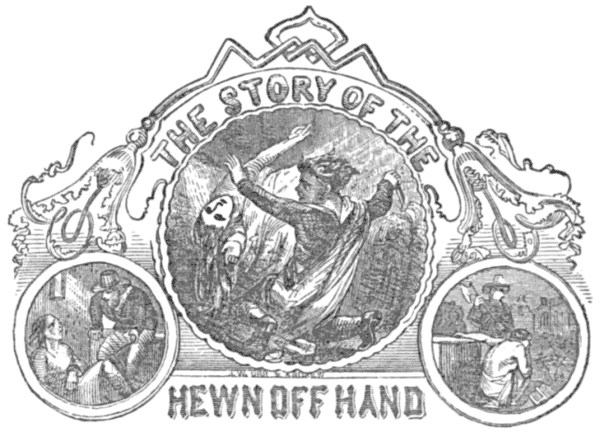
I WAS born in Constantinople; my father was a Dragoman of the Ottoman Porte, and carried on, besides, a tolerably lucrative trade in essences and silk goods. He gave me a good education, since he partly superintended it himself, and partly had me instructed by one of our priests. At first, he intended that I should one day take charge of his business: but since I displayed greater capacity than he expected, with the advice of his friends, he resolved that I should study medicine; for a physician, if he only knows more than a common quack, can make his fortune in Constantinople.
Many Frenchmen were in the habit of coming to our house, and one of them prevailed upon my father to let me go to the city of Paris, in his fatherland, where one could learn the profession gratuitously, and with the best advantages: he himself would take me with him, at his own expense, when he returned. My father, who in his youth had also been a traveller, consented, and the Frenchman told me to hold myself in readiness in three months. I was beside myself with delight to see foreign lands, and could not wait for the moment in which we should embark. At last the stranger had finished his business, and was ready to start.
On the evening preceding our voyage, my father conducted me into his sleeping apartment; there I saw fine garments and weapons lying on the table; but what most attracted my eye was a large pile of gold, for I had never before seen so much together. My father embraced me, and said,
“See, my son, I have provided thee with garments for thy journey. These weapons are thine; they are those which thy grandfather hung upon me, when I went forth into foreign lands. I know thou canst wield them; but use them not, unless thou art attacked; then, however, lay on with right good-will. My wealth is not great; see! I have divided it into three parts: one is thine; one shall be for my support, and spare money in case of necessity; the third shall be sacred and untouched by me, it may serve thee in the hour of need.” Thus spoke my old father, while tears hung in his eyes, perhaps from a presentiment, for I have never seen him since.
Our voyage was favorable; we soon reached the land of the Franks, and six days’ journey brought us to the large city, Paris. Here my French friend hired me a room, and advised me to be prudent in spending my money, which amounted to two thousand thalers. In this city I lived three years, and learned all that a well-educated physician should know. I would be speaking falsely, however, if I said that I was very happy, for the customs of the people pleased me not; moreover, I had but few good friends among them, but these were young men of nobility.
The longing after my native land at length became irresistible; during the whole time I had heard nothing from my father, and I therefore seized a favorable opportunity to return home. There was going an embassy from France to the Supreme Porte: I agreed to join the train of the ambassador as surgeon, and soon arrived once more at Stamboul.
My father’s dwelling, however, I found closed, and the neighbors, astonished at seeing me, said that my father had been dead for two months. The priest, who had instructed me in youth, brought me the key. Alone and forsaken, I entered the desolate house. I found all as my father had left it; but the gold which he promised to leave to me, was missing. I inquired of the priest respecting it, and he bowed and said:
“Your father died like a holy man, for he left his gold to the Church!”
This was incomprehensible to me; nevertheless, what could I do? I had no proofs against the priest, and could only congratulate myself that he had not also looked upon the house, and wares of my father, in the light of a legacy. This was the first misfortune that met me; but after this came one upon another. My reputation as a physician would not extend itself, because I was ashamed to play the quack; above all, I missed the recommendation of my father, who had introduced me to the richest and most respectable families; but now they thought no more of the poor Zaleukos. Moreover, the wares of my father found no sale, for his customers had been scattered at his death, and new ones came only after a long time. One day, as I was reflecting sorrowfully upon my situation, it occurred to me that in France I had often seen countrymen of mine, who travelled through the land, and exposed their goods at the market-places of the cities: I recollected that people gladly purchased of them, because they came from foreign lands; and that by such a trade, one could make a hundred-fold. My resolution was forthwith taken; I sold my paternal dwelling, gave a portion of the money obtained thereby to a tried friend to preserve for me, and with the remainder purchased such articles as were rare in France,—shawls, silken goods, ointments, and oils; for these I hired a place upon a vessel, and thus began my second voyage to France. It appeared as if fortune became favorable to me, the moment I had the Straits of the Dardanelles upon my back. Our voyage was short and prosperous. I travelled through the cities of France, large and small, and found, in all, ready purchasers for my goods. My friend in Stamboul continually sent me fresh supplies, and I became richer from day to day. At last when I had husbanded so well, that I believed myself able to venture on some more extensive undertaking, I went with my wares into Italy. I must, however, mention something that brought me in no little money; I called my profession also to my assistance. As soon as I arrived in a city I announced, by means of bills, that a Grecian physician was there, who had already cured many; and, truly, my balsam, and my medicines, had brought me in many a zechin.
Thus at last I reached the city of Florence, in Italy. I proposed to myself to remain longer than usual in this place, partly because it pleased me so well, partly, moreover, that I might recover from the fatigues of my journey. I hired myself a shop in the quarter of the city called St. Croce, and in a tavern not far therefrom, took a couple of fine rooms which led out upon a balcony. Immediately I had my bills carried around, which announced me as a physician and merchant. I had no sooner opened my shop than buyers streamed in upon me, and although I asked a tolerably high price, still I sold more than others, because I was attentive and friendly to my customers.
Well satisfied, I had spent four days in Florence, when one evening, after I had shut my shop, and according to custom was examining my stock of ointment-boxes, I found, in one of the smaller ones, a letter which I did not remember to have put in. I opened it and found therein an invitation to repair that night, punctually at twelve, to the bridge called the Ponte Vecchio. For some time I reflected upon this, as to who it could be that had thus invited me; as, however, I knew not a soul in Florence, I thought, as had often happened already, that one wished to lead me privately to some sick person. Accordingly I resolved to go; nevertheless, as a precautionary measure, I put on the sabre which my father had given me. As it was fast approaching midnight, I set out upon my way, and soon arrived at the Ponte Vecchio; I found the bridge forsaken and desolate, and resolved to wait until it should appear who had addressed me.
It was a cold night; the moon shone clear as I looked down upon the waters of the Arno, which sparkled in her light. On the church of the city the twelfth hour was sounding, when I looked up, and before me stood a tall man, entirely covered with a red cloak, a corner of which he held before his face. At this sudden apparition I was at first somewhat startled, but I soon recovered myself and said—
“If you have summoned me hither, tell me, what is your pleasure?”
The Red-mantle turned, and solemnly ejaculated, “Follow!”
My mind was nevertheless somewhat uneasy at the idea of going alone with this Unknown; I stood still and said, “Not so, dear sir; you will first tell me whither; moreover, you may show me your face a little, that I may see whether you have good intentions towards me.”
The Stranger, however, appeared not to be concerned thereat. “If thou wishest it not, Zaleukos, then remain!” answered he, moving away. At this my anger burned.
“Think you,” I cried, “that I will suffer a man to play the fool with me, and wait here this cold night for nothing?” In three bounds I reached him; crying still louder, I seized him by the cloak, laying the other hand upon my sabre; but the mantle remained in my hand, and the Unknown vanished around the nearest corner. My anger gradually cooled; I still had the cloak, and this should furnish the key to this strange adventure. I put it on, and moved towards home. Before I had taken a hundred steps, somebody passed very near, and whispered in the French tongue, “Observe, Count, to-night, we can do nothing.” Before I could look around, this somebody had passed, and I saw only a shadow hovering near the houses. That this exclamation was addressed to the mantle, and not to me, I plainly perceived; nevertheless, this threw no light upon the matter. Next morning I considered what was best to be done. At first I thought of having proclamation made respecting the cloak, that I had found it; but in that case the Unknown could send for it by a third person, and I would have no explanation of the matter. While thus meditating I took a nearer view of the garment. It was of heavy Genoese velvet, of dark red color, bordered with fur from Astrachan, and richly embroidered with gold. The gorgeousness of the cloak suggested to me a plan, which I resolved to put in execution. I carried it to my shop and offered it for sale, taking care, however, to set so high a price upon it, that I would be certain to find no purchaser. My object in this was to fix my eye keenly upon every one who should come to inquire after it; for the figure of the Unknown, which, after the loss of the mantle, had been exposed to me distinctly though transiently, I could recognise out of thousands. Many merchants came after the cloak, the extraordinary beauty of which drew all eyes upon it; but none bore the slightest resemblance to the Unknown, none would give for it the high price of two hundred zechins. It was surprising to me, that when I asked one and another whether there was a similar mantle in Florence, all answered in the negative, and protested that they had never seen such costly and elegant workmanship.
It was just becoming evening, when at last there came a young man who had often been in there, and had also that very day bid high for the mantle; he threw upon the table a bag of zechins, exclaiming—
“By Heaven! Zaleukos, I must have your mantle, should I be made a beggar by it.” Immediately he began to count out his gold pieces. I was in a great dilemma; I had exposed the mantle, in order thereby to get a sight of my unknown friend, and now came a young simpleton to give the unheard-of price. Nevertheless, what remained for me? I complied, for on the other hand the reflection consoled me, that my night adventure would be so well rewarded. The young man put on the cloak and departed; he turned, however, upon the threshold, while he loosened a paper which was attached to the collar, and threw it towards me, saying, “Here, Zaleukos, hangs something, that does not properly belong to my purchase.” Indifferently, I received the note; but lo! these were the contents:—



